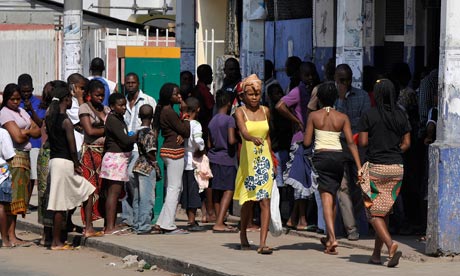After violence in Africa and protests in Egypt, Serbia and Pakistan, the UN are to urge action on the rising cost of food
|
|
| Resident queue for bread in the streets of Mozambique's capital, Maputo. Photograph: Grant Neuenberg/REUTERS |
The UN has called an urgent meeting on rising global food prices in an attempt to head off a repeat of the 2008 crisis that sparked riots around the world.
Seven people, including two children, were killed in Mozambique this week during three days of protests triggered by a rise in the cost of bread. There has also been anger over increasing prices in Egypt, Serbia and Pakistan, where floods destroyed a fifth of the country's crops.
The UN's announcement came after Russian prime minister Vladimir Putin extended the country's ban on grain exports. The ban has been partly blamed for a 5% increase in global food prices worldwide over the last two months, hitting their highest level in two years. The price of wheat has had its biggest monthly rise for 37 years. "In the past few weeks, global cereal markets experienced a sudden surge in international wheat prices on concerns over wheat shortages," the UN Food and Agriculture Organisation said.
"The purpose of holding the meeting is for exporting and importing countries to engage in constructive discussions on appropriate reactions to the current market situation."
Agency spokesman Christopher Matthews said the meeting of the inter-governmental committee on grains will be held on 24 September, most likely in Rome. He added a large number of member countries had expressed concern about a possible repeat of the food crisis two years ago. But agency officials and other experts have stressed that conditions are different from 2008, when high oil prices and growing demand for biofuelspushed world food stocks to their lowest levels since 1982.
The tense atmosphere in developing countries, where food costs up to 70% of family income, erupted in Mozambiquethis week in three days of riots that left seven people dead, hundreds injured and millions of dollars of damage.
"This was the worst rioting I have ever seen in my life, people can really turn very violent and lives are at risk, instead of a peaceful demonstration," said Felizmina Fabia, a resident of the capital, Maputo. As violence continued today, with police firing tear gas and rubber bullets, opposition parties and human rights groups criticised the government, saying it failed to gauge the anger that would be unleashed by the 30% bread price increase and hikes in water and electricity tariffs.
Alice Mabota, head of the Mozambican League of Human Rights, told Portugal's Lusa news agency: "The government underestimated the situation and can't understand or doesn't want to understand that this is a protest against the higher cost of living."
The government-imposed price rise took the cost of a bread roll - the staple of Mozambicans - to 20 US cents (13p) in a country where the average worker earns around $37 (£24) a month.
Egyptians have also protested over food prices in recent months, and analysts have warned that riots could follow the jump in prices in Africa and the Middle East. The trend comes after the global recession already put a squeeze on household budgets and intensified the risk of malnutrition.
In Mauritania in west Africa, rice prices doubled over the first three months of the year, according to the World Food Programme. Over the same period, the price of corn rose 59% in Zimbabwe and 57% in Mozambique.
Niger is suffering severe food shortages and price rises of up to 30%. Save the Children reported last week that the number of severely malnourished children visiting its clinics in Niger has gone up fourfold since the start of the year.
In Russia itself, the price of some essential food products soared 30% in August. Officials have blamed panic buying.
Susannah Nicol, a regional spokeswoman for the World Food Programme (WFP), warned that its operations could soon be affected. "Any food rise means that donations to the WFP will buy less for the hungry and the poor," she said.
In 2007-08, severe food shortages and resulting price rises led to worldwide demonstrations and violence. But analysts say global grain supplies are more abundant this time after bumper harvests in 2008 and 2009.
Daniel Sinnathamby [CORR], regional humanitarian coordinator for Oxfam in southern Africa, said: "There is food around, which was not the case in 2000 and 2003 when production failed. Most countries in the region except Zimbabwe seemed to have had fairly good harvests.
"The question is how does it get around and into the hands of poor people. Governments need to take a look at internal distribution and see who is poor and marginalised."
In June a UN reportwarned that food prices will rise by up to 40% over the next decade due to growing biofuel production and demand from emerging markets.
Source: The Guardian (UK)
